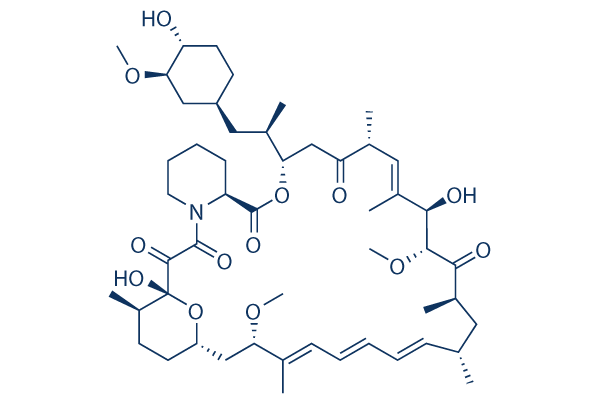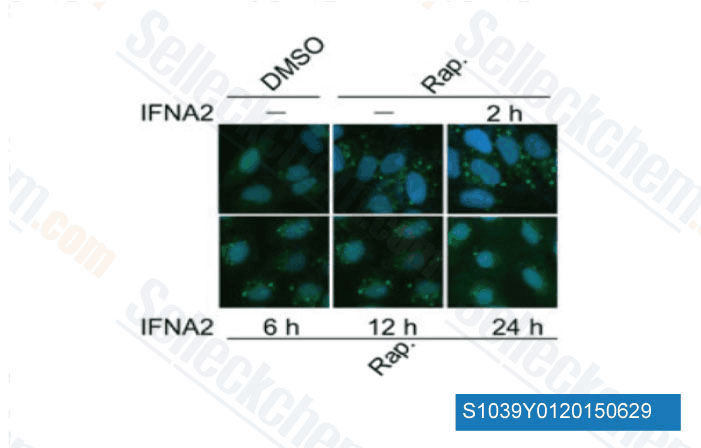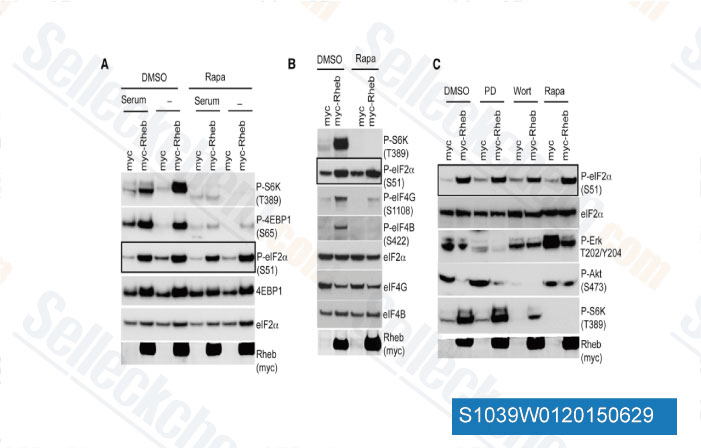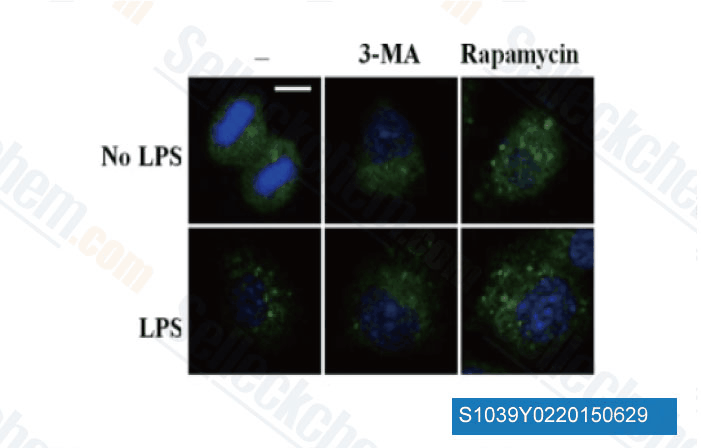|
受注:045-509-1970 |
技術サポート:[email protected] 平日9:00〜18:00 1営業日以内にご連絡を差し上げます |
化学情報

|
Synonyms | AY-22989, NSC-2260804 | Storage (From the date of receipt) |
3 years -20°C powder 1 years -80°C in solvent |
|||
| 化学式 | C51H79NO13 |
||||||
| 分子量 | 914.18 | CAS No. | 53123-88-9 | ||||
| Solubility (25°C)* | 体外 | DMSO | 100 mg/mL (109.38 mM) | ||||
| Ethanol | 25 mg/mL (27.34 mM) | ||||||
| Water | Insoluble | ||||||
| 体内 (毎回新しく調製した物を用意してください) |
|
||||||
|
* <1 mg/ml means slightly soluble or insoluble. * Please note that Selleck tests the solubility of all compounds in-house, and the actual solubility may differ slightly from published values. This is normal and is due to slight batch-to-batch variations. |
|||||||
溶剤液(一定の濃度)を調合する
生物活性
| 製品説明 | ラパマイシン (Rapamycin (NSC-2260804,AY-22989)) は特異的 mTOR 阻害剤であり、HEK293 細胞に対する IC50 は < 0.1 nM です。 |
|---|---|
| in vitro | Rapamycin inhibits endogenous mTOR activity in HEK293 cells with IC50 of ~0.1 nM, more potently than iRap and AP21967 with IC50 of ~5 nM and ~10 nM, respectively. [1] In Saccharomyces cerevisiae, Rapamycin treatment induces a severe G1/S cell cycle arrest and inhibition of translation initiation to levels below 20% of control. [2] Rapamycin significantly inhibits the cell viability of T98G and U87-MG in a dose-dependent manner with IC50 of 2 nM and 1 μM, respectively, while displaying little activity against U373-MG cells with IC50 of >25 μM despite the similar extent of the inhibition of mTOR signaling. Rapamycin (100 nM) induces G1 arrest and autophagy but not apoptosis in Rapamycin-sensitive U87-MG and T98G cells by inhibiting the function of mTOR. [3] |
| in vivo | Treatment with Rapamycin in vivo specifically blocks targets known to be downstream of mTOR such as the phosphorylation and activation of p70S6K and the release of inhibition of eIF4E by PHAS-1/4E-BP1, leading to complete blockage of the hypertrophic increases in plantaris muscle weight and fibre size. [4] Short-term Rapamycin treatment, even at the lowest dose of 0.16 mg/kg, produces profound inhibition of p70S6K activity, which correlates with increased tumor cell death and necrosis of the Eker renal tumors. [5] Rapamycin inhibits metastatic tumor growth and angiogenesis in CT-26 xenograft models by reducing the production of VEGF and blockage of VEGF-induced endothelial cell signaling. [6] Rapamycin treatment at 4 mg/kg/day significantly reduces tumor growth of C6 xenografts, and tumor vascular permeability. [7] |
プロトコル(参考用のみ)
| キナーゼアッセイ | Immunoblotting for the mTOR kinase assay | |
|---|---|---|
| HEK293 cells are plated at 2-2.5×105 cells/well of a 12-well plate and serum-starved for 24 hours in DMEM. Cells are treated with increasing concentrations of Rapamycin (0.05-50 nM) for 15 minutes at 37 °C. Serum is added to a final concentration of 20% for 30 minutes at 37 °C. Cells are lysed, and cell lysates are separated by SDS-PAGE. Resolved proteins are transferred to a polyvinylidene difluoride membrane and immunoblotted with a phosphospecific primary antibody against Thr-389 of p70 S6 kinase. Data are analyzed using ImageQuant and KaleidaGr | ||
| 細胞アッセイ | 細胞株 | U87-MG, T98G, and U373-MG |
| 濃度 | Dissolved in DMSO, final concentrations ~25 μM | |
| 反応時間 | 72 hours | |
| 実験の流れ | Cells are exposed to various concentrations of Rapamycin for 72 hours. For the assessment of cell viability, cells are collected by trypsinization, stained with trypan blue, and the viable cells in each well are counted. For the determination of cell cycle, cells are trypsinized, fixed with 70% ethanol, and stained with propidium iodide using a flow cytometry reagent set. Samples are analyzed for DNA content using a FACScan flow cytometer and CellQuest software. For apoptosis detection, cells are stained with the terminal deoxynucleotidyl transferase-mediated dUTP nick end labeling (TUNEL) technique using an ApopTag apoptosis detection kit. To detect the development of acidic vesicular organelles (AVO), cells are stained with acridine orange (1 μg/mL) for 15 minutes, and examined under a fluorescence microscope. To quantify the development of AVOs, cells are stained with acridine orange (1 μg/mL) for 15 minutes, removed from the plate with trypsin-EDTA, and analyzed using the FACScan flow cytometer and CellQuest software. To analyze the autophagic process, cells are incubated for 10 minutes with 0.05 mM monodansylcadaverine at 37 °C and are then observed under a fluorescence microscope. |
|
| 動物実験 | 動物モデル | Athymic Nu/Nu mice inoculated subcutaneously with VEGF-A-expressing C6 rat glioma cells |
| 投薬量 | ~4 mg/kg/day | |
| 投与方法 | Injection i.p. | |
参考
カスタマーフィードバック

-
Data from [Data independently produced by Autophagy, 2015, 11(4), 617-28]

-
Data from [Data independently produced by Cell Rep, 2015, 10.1016/j.celrep.2015.01.014]

-
Data from [Data independently produced by Biochem Pharmacol, 2015, 95(3), 156-69]
Selleckの高級品が、幾つかの出版された研究調査結果(以下を含む)で使われた:
| Midkine as a driver of age-related changes and increase in mammary tumorigenesis [ Cancer Cell, 2024, S1535-6108(24)00350-7] | PubMed: 39366375 |
| Methylation of GPRC5A promotes liver metastasis and docetaxel resistance through activating mTOR signaling pathway in triple negative breast cancer [ Drug Resist Updat, 2024, 73:101063] | PubMed: 38335844 |
| mTORC2-driven chromatin cGAS mediates chemoresistance through epigenetic reprogramming in colorectal cancer [ Nat Cell Biol, 2024, 10.1038/s41556-024-01473-0] | PubMed: 39080411 |
| Spatial and functional separation of mTORC1 signalling in response to different amino acid sources [ Nat Cell Biol, 2024, 26(11):1918-1933] | PubMed: 39385049 |
| Single-Molecule-Based, Label-Free Monitoring of Molecular Glue Efficacies for Promoting Protein-Protein Interactions Using YaxAB Nanopores [ ACS Nano, 2024, 18(45):31451-31465] | PubMed: 39482865 |
| mTORC1 regulates cell survival under glucose starvation through 4EBP1/2-mediated translational reprogramming of fatty acid metabolism [ Nat Commun, 2024, 15(1):4083] | PubMed: 38744825 |
| Combined inhibition of KRASG12C and mTORC1 kinase is synergistic in non-small cell lung cancer [ Nat Commun, 2024, 15(1):6076] | PubMed: 39025835 |
| mTORC1 regulates cell survival under glucose starvation through 4EBP1/2-mediated translational reprogramming of fatty acid metabolism [ Nat Commun, 2024, 15(1):4083] | PubMed: 38744825 |
| Compensatory growth and recovery of cartilage cytoarchitecture after transient cell death in fetal mouse limbs [ Nat Commun, 2024, 15(1):2940] | PubMed: 38580631 |
| Targeting autophagy overcomes cancer-intrinsic resistance to CAR-T immunotherapy in B-cell malignancies [ Cancer Commun (Lond), 2024, 44(3):408-432] | PubMed: 38407943 |
長期の保管のために-20°Cの下で製品を保ってください。
人間や獣医の診断であるか治療的な使用のためにでない。
各々の製品のための特定の保管と取扱い情報は、製品データシートの上で示されます。大部分のSelleck製品は、推薦された状況の下で安定です。製品は、推薦された保管温度と異なる温度で、時々出荷されます。長期の保管のために必要とされてそれと異なる温度で、多くの製品は、短期もので安定です。品質を維持するが、夜通しの積荷のために最も経済的な貯蔵状況を用いてあなたの送料を保存する状況の下に、製品が出荷されることを、我々は確実とします。製品の受領と同時に、製品データシートの上で貯蔵推薦に従ってください。
